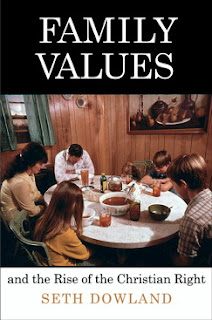The Liberal Protestant Origins of Family Values?
Mark Edwards
This season, give the gift of family values. Seth Dowland’s Family Values and the Rise of the Christian Right (Penn, 2015), that is.
Dowland’s long-awaited book is a masterful survey of contemporary
evangelical conservative politics of the family. Not only does Dowland show how and why,
following challenges to white male authority during the 1960s, evangelicals
exalted the heterosexual nuclear family as the center of American Christianity
and culture—a maneuver which has culminated in protestations by the
President of Oklahoma Wesleyan that “marriage is at the heart of the gospel.” Dowland also explores the racialized nature of
the family values lobby. His study will
prove a great compliment to recent works by Andrew Hartman, Steven Miller, and
others on the culture wars. I know I’m
looking forward to using it in survey classes.
Family
Values also reminded me of my own brief forays into liberal
and ecumenical Protestant concern for the family while I was working on my
dissertation. Robert Self, Heather White, and more have been uncovering the foundations of new conservative
thought about the family among the work of professing liberals during the 1920s
and 1930s. Indeed, Dowland relies
heavily upon Self’s All in the Family
(2013) while framing his own work. Taking a
broad view of family values, it appears that liberal Protestants once again
beat their evangelical rivals to the punch.
It was the nineteenth-century liberal theologian Horace Bushnell, for
instance, who first prioritized family religion over revivalism in his landmark
studies on Christian nurture. Liberal
concern for the well-ordered family—as an oasis among the disenchanting forces
of urbanization and industrialization—continued unabated well into the
twentieth century. Following World War
I, liberal Victorian faith in the family coincided with liberal Protestant
investment in the social sciences. Much
of that work has been explored in Margaret Bendroth’s Growing up Protestant (2002)—I’m sure there are other similar works
I’m not familiar with. However, much
more might be done to unearth the family values work of religious educators and
ecumenical flagships like the Federal, National, and World Council of Churches.
Here’s a brief unpublished passage I wrote years ago that points to liberal interests in the family. Regina Scott Wieman was the wife of Henry
Nelson Wieman, a prominent scientific theologian of the interwar years:
Evident
confusion among their liberal Protestant fellowships concerning what
constituted "liberated personalities" had debatable cultural
consequences, all the same. Since the
early 1930s, the FCC's Committee on Marriage and the Home, in partnership with
religious and federally supported educators, had headed a movement to ensure improved
child care in the United States. The FCC wedded equalitarian family management
and scientific parenting campaigns to its defense of monogamy and criticisms of
trial marriage and easy divorce laws. Having worked out her own ideas through
interaction with secular parenting agencies and the California public school system,
Henry Wieman's wife Regina foresaw a new generation of expert parents
cooperating with pastors, professional educators, and community organizations
in an effort to instill in their children enlightened concern for public
welfare. She upheld earlier liberal religious ideals of children serving as
equal partners in the democracy of family. Wieman and other religious educators
wanted to avoid home lives characterized by "coercing conformity"
and, in that way, to halt totalitarian "regimentation" of the United
States. But could freeing up children to "build [their] own Bible"—in
effect, to discover their religion, morality, and identity for themselves—also
nurture a quest for self-realization opposed to tradition and community? Could
such a project produce the sense of responsibility for public life that these
same educators believed necessary for a free society?
The quotations are from Wieman’s 1937 book, The Modern Family and the Church. I doubt Jerry Falwell and Phyllis Schafly
were reading Wieman or Bushnell when they began positing their family-as-gospel
positions. I don’t think we
can establish direct lines of influence.
At best, as Self and White have taught us, we might simply appreciate
the irony of conservatives now defending once liberal tenets. Or, one of us might get busy writing writing
the history of both conservative and liberal family values.


Comments
Just as liberals themselves are obviating them? Ah, there's the real story.